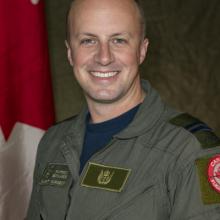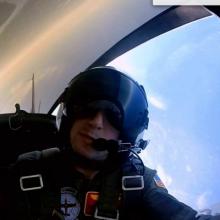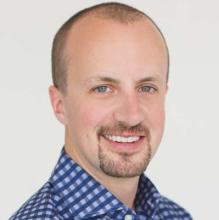Patrick Edwards
What are your main responsibilities or activities in your current position?
As a physician, my main responsibility is to provide health care to members of the Canadian Armed Forces. As a flight surgeon, my scope of practice is sometimes narrowed to the more focused demographic of air crew, and in Cold Lake this is further narrowed to predominantly fighter pilots. Flight surgeons also manage care for all air crew, act as the physician onboard aeromedical evacuations, and have responsibilities for medical aspects of flight safety investigations. The best part of all this is flying in both rotary and fixed wing aircraft, sometimes for specific medical purposes, and sometimes for familiarization with rigors of flight.
How does your current work relate to your graduate degree?
An important part of doctoring is critical thinking. Philosophy is a great foundation for seeing the errors in someone’s reasoning. Another would be ethics. Medicine is full of ethical dilemmas, so a solid foundation in ethical reasoning and the history of ethical debate is a real asset.
What do you like and what do you find challenging about your current position?
Medicine is a very rewarding field to work in. It's easy to focus on how rewarding it can be to save a life, or even just make someone's sore throat feel better, but what I appreciate most is the perspective I get from my job. I regularly see people who are suffering, vulnerable, or struggling. Sometimes it’s physical, and other times it’s mental health. It really makes you appreciate what you have. I get to wear a flight suit to work every day, which isn’t far removed from pyjamas… and little things like that make me happy every day.
Is your current career path as you originally intended?
I had originally intended to do a PhD in philosophy and work as a professor. A BA and an MA in philosophy definitely isn’t the usual path to a career in medicine (or the military), but it’s worked well for me. Focusing in aerospace medicine is something I wanted from the moment I first became interested in medicine.
What motivated you to pursue graduate work at UBC?
Doing an MA in philosophy was a natural progression from my BA and was part of my route toward a PhD and eventually teaching. UBC was a natural fit, as I already lived in Vancouver and knew the department.
What did you enjoy the most about your time as a graduate student at UBC?
The philosophy department at UBC is full of really welcoming faculty and graduate students. Going in every day was a lot of fun. And as a place to live, Vancouver is second to none.
What key things did you do, or what attitudes or approaches did you have, that contributed to your success?
Hard work is important, but I’ve found that for myself, it’s essential to emphasize the direction of that hard work. Dedicated, regular practice, toward specific goals, has worked well for me. But it’s also important to take time for yourself. You need to sharpen your axe. Rest and relaxation can be as important as the hard work. Don’t neglect your mental health, and recognize that rest, like work, requires practice to do it well.
What is your best piece of advice for current graduate students preparing for their future careers?
My advice would be to develop your resilience. This can be done a number of ways. Broadening your horizons through travel is probably the most enjoyable. Failure is the least. But those who do well in the end have often failed along the way, learned from their mistakes, and reinforced their resilience along the way.
Did you have any breaks in your education?
When I was doing my MA, I was training for and going on some high-altitude climbing expeditions. After my MA, I was busy with pre-requisites for med school, but took a couple of semesters off for some longer expeditions. These breaks were planned, and the time off was welcome. I was also able to use the time off regular studies to start my own charity, 7-Dollar-Lives, which was an effort to raise money for malaria-fighting mosquito nets for Africa. The inspiration had come from my travels, and I decided to sell all of my possessions and donate all of the proceeds, to try and inspire others to donate as well. The whole process of selling everything/having nothing may not have helped my career directly, but it made me a better person. And all of the traveling involved in these expeditions surely made me a better physician, if only by broadening my horizons, and allowing me to better relate to my patients. All told, I’m sure I’m better off for these breaks in terms of personal development.
How did you find out about/obtain your current position?
I got interested in medicine after reading an article about how understaffed for doctors the military was at one point, which was during our involvement in Afghanistan. I thought, no matter my view on foreign policy, these people were willing to put their lives on the line for their country and what they felt was the right thing to do. The more I thought about it, the more I realized this was something I could help with, and something that really appealed to me at the same time. And now we’re short on physicians again, so have a look at https://forces.ca/en/career/medical-officer
What challenges did you face in your graduate degree, or in launching your career?
School and careers can be fraught with frustration. I don’t think anyone can escape the occasional frustrating evaluation, command, or result. Since we can’t escape it, we might as well laugh at it. The best part is it works in all aspects of life, not just the professional. Laugh at yourself. Laugh at others. Laugh at the good and the bad. Even when things aren’t going well, keep working the problem, but take the time to laugh too. I’ve been in a lot of sticky situations, and can’t think of any that were worsened by laughter.
How are jobs normally posted and filled in your organization or industry?
This is different for each specialty and location, but there's a global shortage of doctors, so a lot of positions are available. As for the CAF, applicants can apply through their local recruiting office. https://forces.ca/en/career/medical-officer



